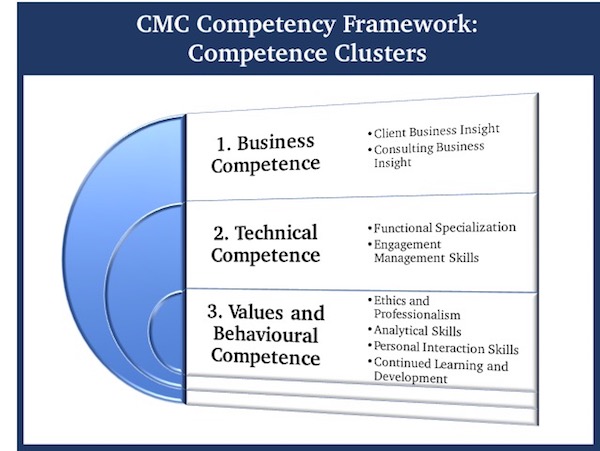By continuing to use our site, you consent to the processing of cookies, user data (location information, type and version of the OS, the type and version of the browser, the type of device and the resolution of its screen, the source of where the user came from, from which site or for what advertisement, language OS and Browser, which pages are opened and to which buttons the user presses, ip-address) for the purpose of site functioning, retargeting and statistical surveys and reviews. If you do not want your data to be processed, please leave the site.
CMC Competency Framework
Requirements leading to the CMC designation (such as the engagement summaries and oral examination) are based on the Certified Management Consultant Competency Profile.
NEW: Click here to download the CMC Competency Framework (Updated 2018).
The CMC Competence Framework specifies the cluster of related abilities, commitments, knowledge, and skills that a management consultant should demonstrate in practice in order to successfully complete an assignment, independently and unsupervised; all of which are underpinned by a code of conduct and professional ethics – professional behaviours. It sets out a standard for those within the profession that is equally relevant for sole practitioners, niche players, and internal consultancies as well as for the major practices and firms. It can be used as a benchmark for clients in developing their expectations of consultants as well as by academic bodies and training providers to align offerings to the market.
The Competence Clusters of the CMC Competency Framework are:
1. Business Competence, which refers to the application of fact-based knowledge of technical skills, business understanding, sector insight, and external awareness. This cluster is subdivided into two competence classes:
A – Client Business Insight, which is the set of discrete competencies that allow a CMC to understand the client condition in the context of the client’s operating, regulatory and competitive environments; and
B – Consulting Business Insight, which is the set of discrete competencies pertaining to the business of consulting itself, and the manner in which consulting services are marketed, procured and delivered. It may include matching resource requirements to client needs, sourcing resources (either internally or externally), and managing those resources in the context of the engagement.
2. Technical Competence refers to the core consulting skills, tools and techniques used by consultants to deliver professional service to clients. This cluster is further broken down into two competence classes:
C – Functional Specialization, which is composed of the blend of competencies related to business, management, and sector/industry expertise that consultants bring to an assignment; and
D – Engagement Management Skills, which describe the competencies which consultants employ to manage client engagements and deliver consulting services.
3. Values and Behavioural Competence refers to the blend of professional values and skills that enable consultants to deliver results for clients now and into the future. They establish credibility and trust, leading to superior results. This cluster is broken down into four competence classes:
E – Ethics and professionalism, which is composed of the discrete competencies that reflect a consultant’s professional conduct and ethical behaviour,
F – Analytical skills, which describes the competencies for decision-making, problem solving and innovation/creative thinking that allow the CMC to deliver advice and solutions tailored to the client situation,
G – Personal interaction skills, which describe the set of competencies that allow the CMC to work effectively with others, and
H – Continued Learning and Development.




